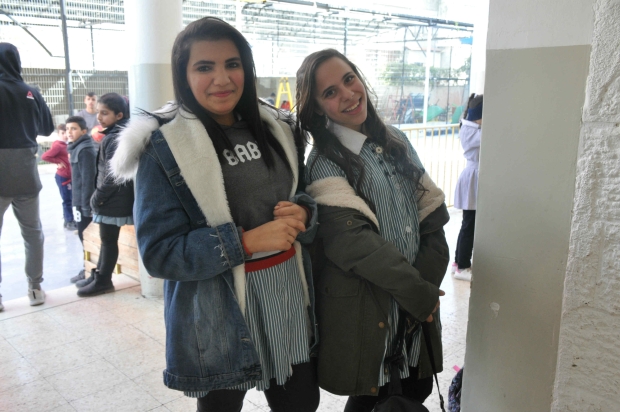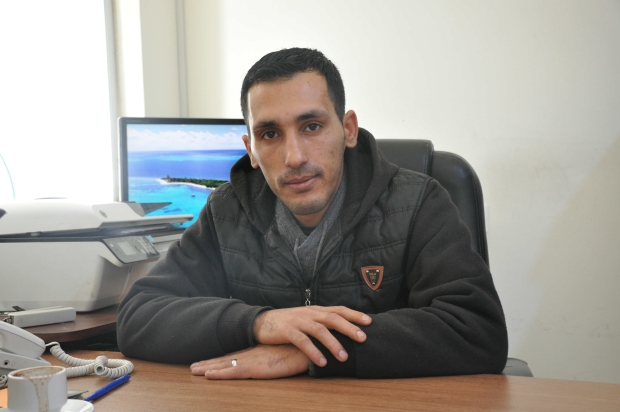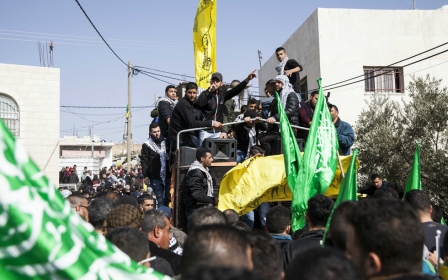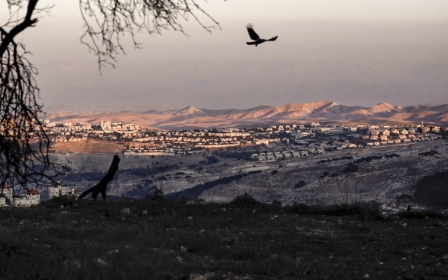Palestinian children fear for their future as Israel moves to shut schools
SHUAFAT REFUGEE CAMP, occupied East Jerusalem – The atmosphere is always tense in occupied East Jerusalem’s neglected Shuafat refugee camp.
Here, children play on roads ridden with trash and sewage, while young teenage boys are forced into dropping out of school to work in garages or restaurants, in order to help make ends meet at home.
At least 24,000 people - the majority of them refugees whose families were displaced in 1948 - live in this patch of lawlessness, caged in between two checkpoints and an 8 metre-high concrete wall that encircles the camp.
News of Israel’s plans to shut down the two United Nations refugee schools here has only added fuel to the fire.
The schools, though lacking in organisation and capacity to serve, are free of cost and offer a small yet meaningful glimmer of hope in a difficult setting.
New MEE newsletter: Jerusalem Dispatch
Sign up to get the latest insights and analysis on Israel-Palestine, alongside Turkey Unpacked and other MEE newsletters
“All my friends are at my school. I love my teachers. We spend more time at school than at home,” said Zuhoor al-Tawil, a 14-year-old student at Shuafat Girls’ School, operated by the UN’s agency for Palestinian refugees, UNRWA.
“Why don’t they wait until we graduate and then close it?” she asked Middle East Eye.
In the latest blow to Palestinian refugees and the education system in occupied East Jerusalem, Israeli media reported last week that Israel will shut down UN schools serving Palestinian refugee camps across the city.
According to Israeli media, Israel’s National Security Council will revoke the permits of schools operated by UNRWA from the beginning of the next school year.
All my friends are at my school. I love my teachers. We spend more time at school than at home
- Zuhoor al-Tawil, student
Schools run by the UN agency will reportedly be replaced by schools the Jerusalem municipality operates, using the curriculum of Israel’s education ministry.
Operating since 1949, UNRWA runs six schools across Jerusalem, serving close to 3,000 students. The agency also runs health centres, and women and youth associations, as well as providing relief and protection services.
In response to the reports, UNRWA released a statement saying it was not informed of any decision to close down the schools.
“At no point since 1967 have the Israeli authorities challenged the basis on which the agency maintains and operates premises in East Jerusalem,” the statement said.
‘Scenario B’
Though UNRWA is concerned, it is trying not to speak of any “scenario B” if Israel decides to close the schools down or restrict the agency’s operations, its spokesperson Sami Mshasha told MEE.
“There are 60,000 Palestinian refugees in Jerusalem. A large portion of them falls under the poverty line. There is a very high unemployment rate, particularly among youth,” Mshasha said.
“If we are removed from Jerusalem, the quality of life for these people will dwindle severely and they will suffer.”
Mohannad Masalameh, executive director of the Shuafat Camp Popular Committee, says that while the UN schools are facing a severe shortage of staff due to recent funding cuts by the US government, their facilities remain better than other schools.
Israel’s Jerusalem municipality operates a number of schools in the camp, where the curriculum of the Palestinian Authority in the West Bank is used, despite repeated attempts by the Israeli government to implement its own.
“You go into the municipal schools here and it’s not even a school atmosphere. The UNRWA schools are much bigger and better. You have a big playground. Most of the municipal schools are rented buildings,” Masalameh told MEE.
“While no decision has been taken, if such a plan is implemented it will have a very negative impact. UNRWA provides jobs to about 85 staff in the schools; they will lose their jobs.”
“And I think people will refuse to accept putting their children in municipality schools with an Israeli curriculum. As Palestinians, some may refuse learning the curriculum of another country that comes into conflict with their patriotism,” he added.
Threadbare facilities
Israel’s targeting of UNRWA schools is just one way its policies are negatively impacting Palestinian education in Jerusalem.
Under Israeli and international law, Israel is obliged to provide adequate education for all Palestinian children in the city.
However, Ir Amim, an Israeli NGO that monitors life for Palestinians in the city, reports that more than 2,500 classrooms are needed to properly serve Palestinian children.
On top of that, it is estimated that some 70 classrooms need to be built every year to meet the Palestinian population growth, but on average Israel builds around 37 annually.
“Until recently, the Jerusalem municipality and the ministry of education attributed the growing shortage of classrooms to the lack of available land on which to build educational facilities in East Jerusalem,” said the group’s report, published in 2017.
“In fact, the scarcity in question is not an actual land shortage but rather a lack of land zoned for public buildings – a direct result of discriminatory planning in East Jerusalem.”
Israel captured East Jerusalem, annexed it and brought its neighbourhoods under Israeli legislation in 1967, in a move that violated international law and which has never been recognised by the international community.
Since then, it has marked 2.6 percent of all land in East Jerusalem for public facilities. In contrast, some 86 percent of East Jerusalem has been allocated for Israeli state and settler use.
The lack of spaces to expand naturally and the ghettoisation of Palestinian neighbourhoods in East Jerusalem have severely stifled the education sector.
Ziad al-Shamale, the head of the East Jerusalem Union of Parents’ Committees, says the lack of space has been the major issue, with the Israeli separation wall between the city and the occupied West Bank stifling development.
“Jerusalem is closed off by the wall, and the schools are already overcrowded. The Israeli government does not give anyone permission or a permit to build a school – not the Palestinian Authority, not the Jerusalem Islamic Waqf – no one,” Shamale told MEE.
“Israel does not want our education sector to develop. They want people who are uneducated, people who drop out,” he continued. “People cannot find homes to live in, so how do you expect them to find schools?”
At least 33 percent of Palestinian students in Jerusalem drop out before completing 12 years of schooling. Every year, more than 1,000 students quit their schools, according to the Ir-Amim report.
The high dropout rate, says Shamale, is partly due to the lack of adequate facilities in Jerusalem’s Palestinian schools.
“There are more than 40 or 45 students in each class, with one teacher. There is a severe shortage of sports fields, playing areas, computer rooms, and even books for children to read,” he said.
A war against the Palestinian curriculum
After decades of neglecting Palestinian schooling, in May 2018 the Israeli government decided to invest 450 million shekels ($122m) in education in East Jerusalem.
However, the money is predominantly earmarked for improving technology and Hebrew classes and towards convincing public municipality schools to switch to the Israeli curriculum.
Zaid al-Qiq is a teacher at a private school and a researcher on education. He says the Israeli government is already trying to convince Palestinian parents and their children to study at municipality schools with an Israeli curriculum.
“The municipality wants to convince them to take the Bagrut [Israeli high school matriculation exams] or to take the psychometric exams [high education entrance exams] instead of the Palestinian exams,” Qiq told MEE.
For Palestinians in the city, taking the Israeli matriculation exams means being able to attend Israeli universities and a wider job market. Until recently, those who wanted to study at the Hebrew University in Jerusalem had to undergo a two-year pre-university programme with a psychometric exam.
Meanwhile, the main campus of the only Palestinian university in Jerusalem – Al Quds University – is cut off from the city by the separation wall. Those who wish to access it must travel twice as far and cross a checkpoint.
We fear that tomorrow, the education sector will all come under the Israeli curriculum. They will be feeding our children the Israeli narrative
- Ziad al-Shamale, East Jerusalem Union of Parents’ Committees
Qiq says under the Israeli occupation the Palestinian education sector is far from independent.
“Even in private schools, the municipality interferes with the hiring of some of the teachers. They interfere with the subjects we teach,” he said.
“Today, they are waging a war against the Palestinian curriculum and we’re seeing that now with the UNRWA schools.”
Shamale, the head of the parents’ committee, agrees.
“We fear that tomorrow, the education sector will all come under the Israeli curriculum. They will be feeding our children the Israeli narrative. After 10 or 15 years, this generation will be Palestinian by name but not by identity,” he said.
“Palestinian students are the victims of this system.”
This article is available in French on Middle East Eye French edition.
Middle East Eye delivers independent and unrivalled coverage and analysis of the Middle East, North Africa and beyond. To learn more about republishing this content and the associated fees, please fill out this form. More about MEE can be found here.







